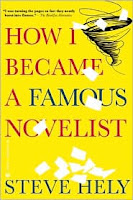 In my blog entry for April 30, I briefly reviewed Kazuo Ishiguro's Never Let Me Go, comparing it to another dystopian novel, The Unit, by Ninni Holmqvist. I recently went to see the movie version of Never Let Me Go (directed by Mark Romanek from a screenplay by Alex Garland). The film adaptation is well done. If you happen to be like me in actually preferring solemn movies that make you think, I recommend this one.
In my blog entry for April 30, I briefly reviewed Kazuo Ishiguro's Never Let Me Go, comparing it to another dystopian novel, The Unit, by Ninni Holmqvist. I recently went to see the movie version of Never Let Me Go (directed by Mark Romanek from a screenplay by Alex Garland). The film adaptation is well done. If you happen to be like me in actually preferring solemn movies that make you think, I recommend this one.The story centers around the lives of three friends--Kathy, Tommy, and Ruth--played by Carey Mulligan, Andrew Garfield, and Keira Knightley, respectively. All three display good acting. Mulligan is required to convey a lot nonverbally and succeeds. Knightley impresses in completely inhabiting an unsympathetic character. When I read the book, I pictured the character of Tommy as a blond, perpetually youthful pretty boy--not resembling Andrew Garfield--but it is a testament to his acting chops that I was able to accept him in the role.
This is a story of a complicated friendship/love triangle, at first oddly insulated from the cruel reality of the society and then thrust out into it, with the chips falling where they may. Some hope is kept alive, but there is a (perhaps strange) resignation in the attitudes of the friends. Tommy is arguably the most likeable character because he has an innocent, appealing quality and may have the least sense of resignation of the three friends.
The film is largely faithful to the book. In the film version, the shocking premise of the plot is revealed early on by a new teacher, Miss Lucy (Sally Hawkins, in a small but memorable role). In the book, this character does not reveal as much, so the three friends, as well as the reader, are kept in the dark for longer. The book is therefore more subtle. Both the book and the film explore haunting questions about mortality, love, and duty. This is a deeply affecting movie, with an elusive message that is difficult to put into words.

